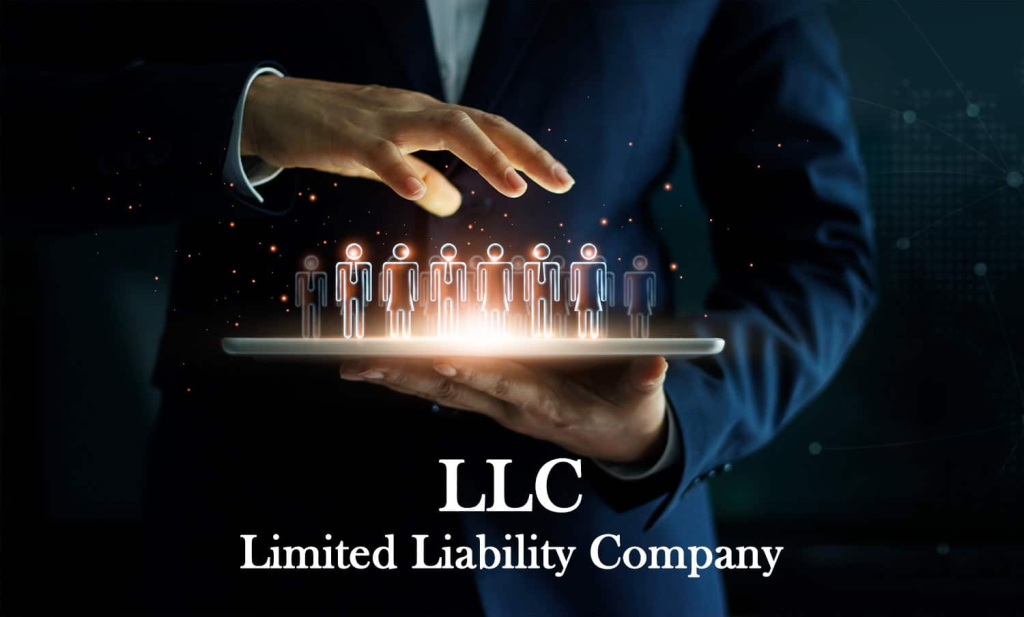Key Benefits of Forming an LLC for Your Business
by Shethana Jul 08, 2024  18 MIN READ
18 MIN READ

Limited Liability Companies, or LLCs for short, are a favorite choice among business folks because they keep personal stuff like houses and savings safe if the company runs into debt. Think of an LLC as its own person that can take the blame, so the owners don’t have to. This setup is not just about protection; it also lets businesses run in a way that suits them best. Each state has its rules on how to start an LLC, which usually means filling out some paperwork called Articles of Organization with someone important called the Secretary of State. By understanding all this, people who own businesses get why LLCs are such a big deal and often decide it’s the right way to go for their ventures.
What is an LLC?
An LLC, which stands for Limited Liability Company, is a type of business structure that’s really handy because it mixes the easy-going nature of a partnership with the safety nets you get in a corporation. This setup keeps your personal stuff safe if things go south and lets profits pass through to owners without getting taxed twice. A lot of small businesses go for LLCs since they’re straightforward and offer solid legal shields.
The Legal Structure of LLCs
An LLC mixes things up by taking bits from both corporations and partnerships. This setup means the people who own it don’t have to worry about losing their personal stuff if the business owes money, which is a big plus compared to just running things on your own or with a partner without this protection. At its heart, an operating agreement spells out who owns what, who’s supposed to do what, and how any money made gets split. It’s super important because it lays down the rules for how everything in the company works together. By getting how LLCs are set up legally, owners can make sure they’re doing right by the law and keeping their interests safe.
Key Benefits of Forming an LLC
For business owners, forming Limited Liability Companies (LLCs) comes with several key perks. At the top of the list is limited personal liability, which means if things go south, your own stuff—like your house or car—isn’t up for grabs to cover business debts. With LLCs, there’s also a sweet tax deal because profits get passed directly onto your personal tax returns; this setup can save you money on taxes. Plus, when it comes to running the show, LLCs are pretty flexible—you can set up management however it works best for your company. This combo of protecting personal assets from risks tied to business ventures and having options that cater well both in terms of taxes and how you run things makes choosing an LLC as a business structure a smart move for entrepreneurs looking for security and adaptability in their businesses.
Limited Personal Liability
One of the biggest perks of setting up an LLC is that it offers limited personal liability. What this means is, if your business runs into debt or legal issues, you as a member won’t have to worry about losing your house, car, or savings because they’re protected. This kind of protection keeps your personal stuff safe from any business troubles and gives owners a lot less to stress about since their private money and assets are kept separate from the company’s debts. For anyone thinking about how to structure their business entity, understanding how this works can be really beneficial. It’s something that draws many business owners towards choosing an LLC since it ensures that the members of the LLC aren’t personally on the hook for what happens in the business side of things – keeping their personal assets secure.
Tax Advantages
For business owners, LLCs bring some pretty big tax perks to the table. With something called pass-through taxation, the money the company makes doesn’t get taxed right off at the company level. Instead, it goes straight through to your personal tax returns. This setup can save you from what’s known as double taxation, a headache that other types of businesses often have to deal with where their profits are taxed twice. On top of that, LLCs let members decide how they want to split up the profit for taxes in ways that work best for them individually. So if you’re starting a business and looking into how you can keep more of your earnings away from Uncle Sam, getting familiar with these benefits is a smart move.
Operational Flexibility
Operational flexibility in an LLC means the business can easily adjust how it runs internally. With an LLC, owners have various choices for managing the company; they can decide if all members manage together or appoint specific managers. This setup helps make decisions faster and share out tasks effectively. Also, running an LLC is simpler because there are not as many strict rules to follow compared to other types of businesses, making everyday work smoother without affecting the business’s official status. This kind of agility gives llc owners a better chance to adapt to market changes quickly and tackle new opportunities or problems as they come up.
Financial Benefits for LLC Owners
One of the big perks for LLC owners is what’s called Pass-Through Taxation. This means that instead of the business itself getting taxed and then its owners again on their personal income, all profits and losses go straight to the LLC members’ personal tax returns. So, you skip over double taxation. Another cool thing is Profit Sharing Flexibility. With this, how much money each person gets doesn’t have to match up exactly with how much of the company they own. It opens up a lot of doors for smart financial planning without messing with the protection against losing more than you’ve put in, known as limited liability, that comes with an LLC.
Pass-Through Taxation
In pass-through taxation, the money an LLC makes or loses goes directly to its owners. This way, the business entity itself doesn’t pay taxes on what it earns. Instead, each owner adds their part of the earnings or losses to their personal tax returns. By doing this, we avoid double taxation – a problem where both a company and its shareholders have to pay taxes. For anyone thinking about starting an LLC, this is a big plus because it makes dealing with taxes simpler and might even save money for the owners.
Profit Sharing Flexibility
With LLCs, the way profits are shared is really flexible. This means that owners can decide how to split up the money based on what they’ve agreed upon in their operating agreement. By doing this, everyone’s different contributions or investments can be taken into account. It’s a setup that lets profit sharing match both the goals of the business and what each person has put into it, which makes things fair and encourages people to stick around for longer. On top of that, being able to share profits in various ways helps everyone work better together as a team because it feels like they’re all aiming for common success. This kind of flexibility doesn’t just make financial matters clearer; it also brings llc members closer together by making sure everyone’s working towards growing the business and benefiting from its success together.
Protecting Your Personal Assets
When you set up an LLC, it’s like putting a big protective bubble around your personal stuff—like your house or savings. This is because of something called limited liability, which means if your business gets into legal trouble or owes money, people can’t go after your personal assets to settle those debts. It keeps any problems with the business from messing with what you own personally. By making your business its own legal entity, you get to run things without worrying too much about losing what’s yours if things don’t go as planned.
How LLCs Shield Personal Assets
By setting up an LLC, owners create a separate legal entity that keeps their personal stuff like houses, cars, or savings safe if the business runs into debt or legal problems. This is really important because it means the people who own the LLC only risk what they’ve put into the company. In other words, if things go south for the business, law sees it as its own problem and not something the owners have to empty their pockets for. By keeping these two worlds apart – your personal assets and your business – you make sure that your hard-earned belongings are protected from any unexpected issues with your venture.
Comparing Asset Protection in LLCs vs. Other Business Structures
When it comes to protecting your personal stuff from business troubles, LLCs are a pretty solid choice. With an LLC, the money and property you own personally aren’t up for grabs if your business runs into legal issues or owes debts. This is a big plus compared to running things on your own or with partners where your personal assets could be in danger. While companies like S corporations and C corporations also keep your personal assets safe, they come with more rules to follow. For business owners looking out for their interests, knowing how different types of businesses stack up in terms of keeping personal wealth secure is key. It helps them choose what’s best based on how much risk they’re okay with and what they want for the future.
Flexibility in Management and Operations
When business owners set up an LLC, they get a lot of room to run their company the way they see fit. This is different from other ways of setting up a business like corporations or partnerships. With an LLC, the people in charge can decide how they want to manage things and make choices that are best for their own situation. They also have control over how profits and losses are shared out among members. By tailoring both management structure and day-to-day operations, owners can build a setup that really works well and helps their business grow.
Management Structure Options in an LLC
One big plus of setting up an LLC is how it lets you decide who runs things. Unlike corporations, with their board of directors and shareholders, or partnerships filled with partners, LLCs let the people who own them call the shots directly. This setup means if you’re a member (that’s what we call owners in this world), you can be right there making decisions about everyday stuff without needing a separate group like a board to do it for you.
On another note, if there are quite a few members in your LLC and not everyone wants to get their hands dirty with daily tasks, you have the option to pick one or more managers to take care of business. This way works great because while some members dive deep into areas they excel at or maybe focus on different projects altogether; everyone still gets the perk of limited liability protection that comes along with being part of an LLC’s unique management structure.
Ease of Compliance and Administration
For many business owners, dealing with compliance and administration can feel like a heavy load. But, by setting up an LLC, these tasks become much easier to handle. At the heart of staying compliant is choosing a registered agent for your LLC. This person acts as the main point of contact between your company and the state authorities, taking care of all legal and government letters for you. It’s their job to make sure that any important paperwork or notices reach your LLC without delay.
On top of this, running an LLC means you don’t have to deal with as many reporting duties or keep track of records in such detail compared to running a corporation. Corporations are often required to organize regular meetings for their board members and keep minutes meticulously; however, an LLC gives you the liberty not only in how formal internal processes need be but also in organizing meetings which significantly lowers what’s on your plate administratively speaking.
Moreover,, states offering online filings add another layer of convenience making it simpler for LLCSs manage their administrative needs effectively .
Enhancing Business Credibility
Creating an LLC can really boost how people see your business. With an LLC, you have a legal entity that’s official and recognized, making your business appear more legit and reliable to customers, suppliers, and anyone you might want to work with. This is especially important for businesses in fields where being seen as credible and trustworthy matters a lot, like in professional services or if you’re starting a tech company.
The Impact of an LLC Status on Business Partnerships
When you run your business as an LLC, it’s like giving it a shield that makes everything more official. This setup means the company is its own thing, separate from the people who own it. Because of this, folks looking to team up with you might trust you more since they see your business as legit and serious. Plus, having an LLC means if things go south—like owing money or legal troubles—the owners’ personal stuff isn’t on the line thanks to limited liability protection.
On top of all that, being an LLC lets you mix things up by creating hybrid setups where different kinds of partners can join in—be they individuals, other companies or even other LLCs. With such flexibility in how partnerships can be formed under an LLC structure; attracting various types of partners becomes easier which could really help a business grow and succeed by bringing in diverse strengths and resources.
Attracting Investors as an LLC
Starting a business as an LLC can really catch the eye of investors. With personal liability protection, owners don’t have to worry about losing their stuff if things go south. This is a big deal for people putting money into your business because they know they’re not on the hook for any debts or problems.
On top of that, with an LLC, you get to play around with how ownership is split up. You can set up different kinds of shares or interests that let investors choose how much control or say they want in running the show. It’s great for those who are looking for just the right fit in terms of investment and involvement.
Moreover, if you’re aiming to attract investments from abroad, having an LLC could be more inviting. Some foreign folks might face fewer hurdles investing in this kind of setup due to rules back home favoring certain structures over others. So by going with an LLC, you’re potentially opening doors wide open for growth by welcoming various types of investors onboard.
State-Specific Considerations for LLCs
When you’re thinking about setting up an LLC, it’s really important to look into the rules and steps that your state requires. Every state has its own set of laws for starting and running an LLC. This means there are specific things you need to do depending on where your business is going to be, like filing articles of organization, picking someone as a registered agent, handling franchise taxes, and keeping up with reports and other legal stuff.
For business owners wanting everything done right from the start, getting familiar with these state-specific details is key. It might also be a good idea to talk to lawyers or financial experts who know all about what your particular state asks for. They can help make sure your LLC follows all the local rules properly.
Understanding Different State Requirements
Each state has its own set of laws and requirements for forming and maintaining an LLC. These requirements can vary significantly, so it is important for business owners to understand the specific rules and regulations of the state in which they wish to form their LLC. Here are some key factors to consider when understanding different state requirements:
- Name availability: Each state has its own rules regarding the availability and registration of business names. Before forming an LLC, it is important to check if the desired name is available and comply with any naming restrictions imposed by the state.
- Articles of Organization: This is the document used to formally create an LLC. The requirements for the content and filing of the Articles of Organization can vary by state. It is important to follow the specific instructions provided by the state’s Secretary of State or similar governing body.
- Registered agent: Most states require LLCs to have a registered agent, who is responsible for receiving legal and government correspondence on behalf of the LLC. The registered agent must have a physical address within the state.
- Franchise tax: Some states impose a franchise tax on LLCs, which is a fee paid for the privilege of doing business in the state. The amount and due date of the franchise tax can vary by state.
| Column Name A | Column Name B |
| Name availability | Check if desired name is available and comply with naming rules |
| Articles of Organization | Follow state-specific rules for content and filing |
| Registered agent | Appoint a registered agent with a physical address in the state |
| Franchise tax | Understand if the state imposes a franchise tax and comply with any requirements |
Best States to Form an LLC
In the United States, some places are just better for setting up an LLC because of their business-friendly vibes. Take New York as a prime example. It’s not only packed with successful companies ranging from huge corporations to fresh startups but also shines as a worldwide center for finance, media, and tech stuff—especially in New York City.
On top of that, states like Delaware, Nevada, and Wyoming get thumbs up too. They’re known for having tax rules that businesses love, solid legal systems in place to protect them, and regulations that make doing business there pretty smooth sailing.
For business owners thinking about where to start their LLCs should really look into what each state offers. Things like how good the area is for businesses generally speaking; if there are any sweet tax deals; what kind of legal backup you’d have; or even if your specific industry has any perks somewhere particular should all be on your checklist. Chatting with folks who know lots about law and money can help figure out which state would fit best based on what you want to achieve with your business.
Conclusion
Starting an LLC comes with a lot of perks. For starters, it keeps your personal stuff safe if things go south because you’re not personally on the hook for business debts or lawsuits. It’s also great for saving money on taxes and gives you more control over how you run things and share profits. Plus, having an LLC makes your business look more legit to people outside, like investors who might want to put their money in what you’re doing. Depending on where you set up shop, there are different rules to follow which is super important to get right from the start. By picking the best state for your LLC and making the most out of what it offers, you’re laying down a strong base that can help your business grow big and strong.
Frequently Asked Questions
Is an LLC Right for Every Business?
Deciding to set up an LLC isn’t always the best move for every company. It really comes down to different things like how big your business is, what kind of work you do, how many people own it, worries about being responsible for debts or lawsuits, and thinking about taxes. Before picking a business structure that works best for you, talking with experts in law and finance can help a lot.
How Does an LLC Impact Federal and State Taxes?
When it comes to taxes, how an LLC is handled depends on a few things like how many people own it and the decisions those owners make. If there’s just one owner, the government usually sees it as a sole proprietorship when tax time rolls around. On the other hand, if there are multiple owners, it’s seen as a partnership. But here’s something interesting: LLCs have the option to be treated like corporations for tax purposes if they fill out some forms and send them off to the IRS. With states having their own rules about taxes, talking with someone who knows all about taxes can really help you figure out what forming an LLC means for your wallet.
About Arnifi:
Arnifi is digital first Corporate service provider helping companies enter the Middle East region, starting with UAE and Saudi Arabia markets. Founded and backed by professionals from Amazon, Souq and other large companies operating in KSA – the team understands what it takes to succeed as a startup in both UAE and Saudi Arabian markets, apart from going through the setup process multiple times. Arnifi will provide a truly digital experience to entry and scale up of companies both UAE and Saudi Arabia. Discover tailored solutions and strategic partnerships that propel your business forward. Check out at – www.Arnifi.com for more details.
Also Read: Beginner’s Guide to Understanding Texas Business Taxes
Top UAE Packages

Related Articles
Top UAE Packages



